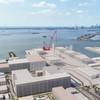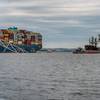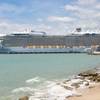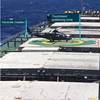The entire United States (and anyone else in the world with access to cable or for that matter any TV) has become intimately involved in what is sure to become the seminal event of our time. The World Trade Center terrorism will change all of our lives in some respect from the day of the event onward. The only question is how much our lives will be changed. Even after the current threats pass our lives will ever be altered. It is up to our government and us as to the direction our country and our lives will take. If we leave it to our enemies, they would destroy us. — by Charley Havnen
Port Security
Security of our airborne and waterborne commerce has now become a major national issue. This is an opportunity for the USCG to bring the maritime industry together for the common good.
The Secretary of the Department of Transportation (DOT) has directed the USCG improve waterborne security in our port areas, as is being done with the air travel industry. Initially this meant that individual Coast Guard Captain of the Port (COTP) units and Districts were to quickly develop plans and methodology suitable to each individual port area.
There is no question that the USCG is taking great pains attempting to minimize the impact upon maritime commerce while incrementally increasing waterborne security.
The USCG knows that the only real way to prevent the type of sabotage that we are worried about is to place armed personnel on every vessel within the U.S. Territorial Sea. If maritime sabotage does occur this may be the only appropriate course of action.
Our ports and waterways are so complex and diverse that variations from one port area to another are appropriate, certainly on a short term basis and probable in the long term. It is likely that ocean going deep draft traffic will be treated somewhat differently from non-ocean going vessels because potential threats are different.
These increased security measures at the minimum request all facility and vessel operators to review their security procedures and possibly update them. Formal security plans are not currently required. In some ports data concerning vessel movements, cargo movement information and crewlists are required. Some ports require specific authorization from the USCG Captain of the Port to navigate at all.
Specific liquid cargo movements and cargo handling will come under close scrutiny in some ports and not in others.
Containers will be of particular concern and will be extremely difficult to keep secure. It is not at all clear how passenger cruise lines will be impacted around the country.
The variations from one port area to another are too numerous to specifically enumerate. The information is however available from each local Captain of the Port office around the country.
It will likely be very difficult for individual vessels and operators to become expert in the broad range of security expectations from one port to another, but it is essential to our survival as a successful commercial nation.
Coast Guard Area Commanders (both East and West) have promulgated special regulations under 33 CFR Part 165 concerning Naval Vessel Protection Zones. These zones limit and control traffic in close proximity to naval combatants, auxiliaries, and vessels leased to or chartered by the U.S. Navy.
All vessels within 500 yards of a naval vessel must operated at minimum speed and proceed as directed by the authorized officers (USCG Captains of the Port or other designated officer). Vessels may not approach within 100 yards of a naval vessel without permission of these authorized officers.
Clearly, the goals of Port Security are to obstruct terrorism and not impede commerce. While the mechanisms to accomplish this will change and evolve over the coming months, the USCG seems to be making great efforts in working closely with the maritime industry to achieve both of these goals.
STCW
We had originally intended that this entire article should concern the implementation of Standards of Training, Certificating and Watchkeeping '95 (STCW-95) which is a major alteration of the previous STCW-78.
Mariners currently holding STCW-78 documents will need to complete additional training and obtain STCW-95 documents by February 2, 2002. All mariners must provide evidence of competency in Basic Safety Training (BST). Deck officers must be assessed in Bridge Resource Management. All engineers must be Lifeboatmen qualified. Further, depending on the specific vessel that an individual is employed upon, he or she will also need Global Marine Distress Safety System (GMDSS) and/or Automatic Radar Plotting Aids (ARPA) assessments.
Upgrades and changes in scope of licenses and merchant mariner's documents (MMDs) mandate that the individual comply fully with the new STCW-95.
We believe that there are serious potential shortfalls that could occur in supplying qualified personnel. We believe that individual mariners, particularly those serving on seagoing vessels normally considered to be of limited tonnage (
Individual mariners are charged to obtain the training. In Europe and much of the rest of the world, the training is provided (sometimes at a nominal cost) to mariners. In the US, employers provide some of the training, deep draft unions are a major provider for their members but in the end it is the responsibility of the mariner to schedule, pay for and obtain the training in a timely manner. Human nature being what it is, many mariners delayed obtaining the training until the last few months before the deadline.
The problem with this is that most if not all of the approved schools are booked up and the training is not available for the large numbers of persons needing it by February of 2002.
Some of the mariners that will be unable to schedule classes to complete STCW-95 requirements are involved in commerce that will be critical to our national defense. It is not yet clear how the USCG will resolve these issues. Regional Examination Centers (RECs) around the country are extremely adept at being unresponsive to mariners' inquiries and problems. To assume that they will do otherwise in the instant case may be unproductive. Specific problems should probably be put in writing and provided to the Officer in Charge of Marine Inspection (OCMI), the REC's boss.
If the magnitude of this problem is as serious as we suspect, some sort of relief is appropriate and may be available if the USCG is approached correctly. Our current national emergency will play a significant role in any solution.
It is just possible that the current crisis could generate a slight shift in the USCG politic, from that of enforcer of domestic and international law to that of facilitator of commerce. This could be done without negatively impacting environmental statutes or regulations, as was done during WWII, the Korean War and Viet Nam.
There are many of us that believe that the interests of the U.S. would be better served during the current emergency by such a change in regulatory posture.
Charley Havnen is a Commander USCG Ret. His organization can help you with your vessel construction project, regulatory problems, vessel manning issues, procedure manuals, accident analysis or
Subscribe for
Maritime Reporter E-News
Maritime Reporter E-News is the maritime industry's largest circulation and most authoritative ENews Service, delivered to your Email five times per week










